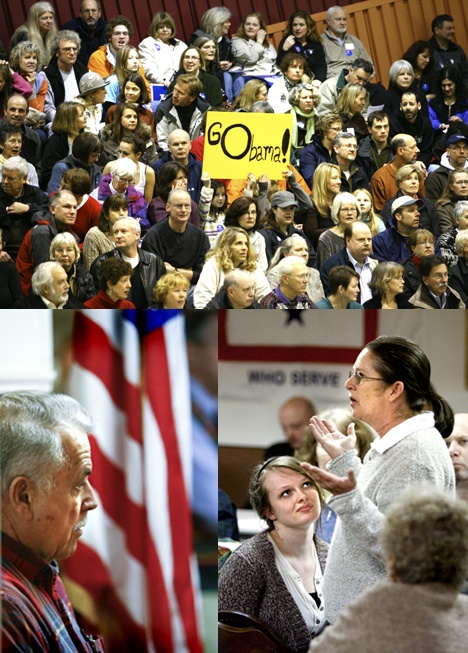Turnout is huge as Washington plays an unexpectedly key role in the caucuses. Barack Obama sweeps up 80 percent of Bainbridge’s Democratic delegates.
By Tad Sooter, Staff Writer
and Sean Roach
and Laura Newlon
Special to the Review
Unprecedented swarms of Democrats threw their weight behind Barack Obama for presidential nominee at island caucuses Saturday, while Republicans favored GOP frontrunner John McCain.
Obama scored a definitive victory over rival Hillary Clinton, sweeping up 180 of the island’s 227 delegates in unofficial results released Tuesday. Clinton picked up 45 delegates, leaving two undecided.
Turnout was bolstered by a rare chance for local voters, usually overshadowed by Super Tuesday results elsewhere in the nation, to have a significant effect on the nominations.
“This is the first time in my lifetime where Washington could make a difference in the presidential outcome,” north-end resident Rose Berg said at Sakai’s Democrat caucus. “It feels like a field of dreams here today, you know, if they build it they will come. I mean, look at all these people.”
Turnout exceeded expectations at caucus locations around Bainbridge. Disorganized lines, packed gymnasiums and raucous supporters were all par for the course.
While the Democratic caucus took the national spotlight over the weekend, both Republican and Democratic caucuses are impacting candidate standings.
Reflecting state and Kitsap County results, a wide majority of island Democrats turned out for Obama, helping keep the scales balanced in the party’s tight nomination race. Obama won in all 22 island precincts, at least tripling Clinton’s delegate count in all but one caucus.
Roughly half the 149 Republicans who gathered at the American Legion Hall favored McCain, according to Scott Manson, who coordinated the pooled caucus. Undecided voters made up the second largest group, followed by supporters of Libertarian-leaning Ron Paul and former Arkansas governor Mike Huckabee.
Republican turnout dwarfed numbers from 2004, when only 60 GOP faithful came out to caucus. Manson said the switch to a Saturday event and interest in state and local candidates, including Dino Rossi’s bid for governor, added up to a full house and lively participation.
“We might only have a small representation on Bainbridge, but it’s vocal and very excited,” Manson said.
McCain and Huckabee were deadlocked in Kitsap County, and the statewide the Republican caucus was marked by a well publicized challenge of delegate counts by Huckabee.
Kitsap County Republican Committee Chair Jack Hamilton said that debate is largely meaningless because the Republican caucuses elect delegates who are not obligated to vote for any individual candidate.
The Feb. 19 primary and the state convention will determine the actual allocation of Republican delegates for the national convention.
“It’s not until the primary that we have any indication on delegates,” Hamilton said.
Meanwhile, turnout at the Democratic caucuses set a new bar for political involvement on Bainbridge.
Meadowmeer precinct officer Walker Willingham said his caucus was one of many that drew a flood of new participants.
“Everyone I heard from had more than double turnout from 2004, and some were triple,” Willingham said. “And that’s remarkable because in 2004 the turnout was considered unprecedented.”
“Change” is the buzzword for Democrats in the upcoming election and much of the talk among caucus-goers centered on whether Obama or Clinton would be able to bring it about.
“I think we would be in a better place with either one of the (Democrat) candidates,” said caucus attendee Bob Tull. “I want to see a reversal of so many policies. Bush has destroyed the environment, the war and the economy…
“But I guess I’m leaning toward Hillary. I think she’s gritty and smart, she knows the system, and the world. We need someone that doesn’t need a two-year learning curve.”
For first-time voter Haley Mathisen, the fresh face and charisma brought by Barak Obama can garner the votes and bridge the gaps needed to give the country new direction.
“The turnout today is positive and exciting,” Mathisen said. “Obama is the poster child of change, He’s really intelligent and has a plan for our future. He cares for our country, so it will be exciting to see this close race.”
Within precincts at caucus, citizens lauded candidates, debated policy stances and tried to convince a handful of undecided voters to climb off the fence, with little success.
One undecided Democratic voter, who declined to give his name, expressed concern over how both candidates would fair in a contest against McCain.
“I’m just pessimistic that any of them will be elected,” the man said. “I would have hoped for one of the radical Republicans to have won the party nomination, then it would have been easy to take over the middle.
“But McCain pretty much plays both sides of the aisle and can actually bring the country together. Unfortunately, the other candidates don’t have a good track record for that.”
Bridging the divide at home and abroad was an important talking point for most islanders interviewed at the Democrat caucus. To first-time attendee Kirk Godtfredsen, it is the only sign of a successful presidency.
“From what I can hear I was in agreement with most of the statements for both sides,” Godtfredsen said. “I know that any president is going to be restricted in what they can actually do. But I think everyone having a better attitude about the government, and trying to get stuff done together, if that is all we end up with I would be happy.”
Despite the varied and adamant views brought out in the caucus, it was a rare opportunity for people of all ages and social distinctions to come together and discuss their community and their country’s future.
“I’ve never been to a community event like this,” said high school student Annie Lukins. “I want to know the people that are voting in our community and I want to know what people outside of high school think. It’s an important event and it’s important it is to have your voice be heard.”



